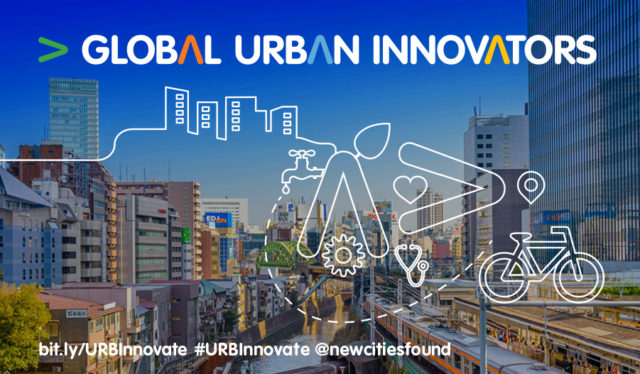
Launching the Global Urban Innovators Initiative: Q&A with Naureen Collings
November 16, 2015 — Blog
Today, the New Cities Foundation launched our new Global Urban Innovators initiative! We are calling for applications to find the 10 most innovative startups and social enterprises that use technology to tackle the biggest urban challenges of our time. This program is specially designed to identify pioneering urban innovations and to help scale their project globally.
Here in Paris, we sat down with NCF’s Director of Urban Innovation and Research, Naureen Collings, to find out more.

First of all, how did Global Urban Innovators come about? How is NCF placed to take the lead in the promotion of urban innovation?
NC: As urban populations are growing at a rapid pace, the idea of Global Urban Innovators came about because we saw the need for cities to learn about local urban innovations that are taking place around the world, transforming cities from the ground up. We also see that the young technology startups and social enterprises that are behind these innovations all aspire to go beyond their local boundaries and improve cities everywhere. We know that there are a lot of amazing projects that are just getting started that are tackling the big problems in cities – traffic congestion, pollution, inadequate infrastructure, lack of public spaces and so on – in truly innovative ways. The Global Urban Innovator initiative aims to connect these transformative organizations with decision-makers in government and business to help them achieve their goals and scale their projects.
Since NCF was founded 5 years ago, we have been building a global network of cross-sector leaders that focus on cities and who have important resources that are crucial to the success of new innovators. These leaders include mayors and policy-makers who shape the policy environment in cities, as well as business executives who can provide valuable expertise, in-kind support or even funding to support innovative projects. NCF brings our global network together several times a year during urban innovation events such as our New Cities Summit where we promote the work of innovators to help accelerate the impact of their projects. Not only that, we keep in close contact with the innovators throughout the year, constantly looking for business development opportunities, whether this means connecting them to experts, or bringing them exposure in the international media. We’ve seen how valuable this has been to our existing community of innovators. Just one example is Colab, a Brazilian mobile app that connects citizens directly to public officials to report issues to cities, whose cofounder said that, before presenting at our New Cities Summit 2013 in Sao Paulo, they were a project, and now they are a company.
Why does the Foundation believe it is important to be focusing on technology within the urban sphere?
NC: We recognize that technology alone will not address all urban problems. However, technology does have the power to rapidly transform, scale up, and reach large numbers of people in a way that other innovations rarely can. For its ability to translate across a variety of local contexts, its speed of delivery and clear mechanisms for creating new markets, the application of technology is a core focus of the Foundation’s work in the urban sphere.
How do you believe innovative technology-based solutions will address issues in today’s cities?
NC: There are many ways technology is addressing urban challenges today. We only have to look at our cohort of past urban innovators to see the variety and extent to which their technology-based solutions are providing valuable products or services that improve urbanites’ lives. From Lufa Farms that provides fresh produce grown atop a massive factory rooftop in Montreal, to Nextdrop that notifies slum dwellers in Indian cities when water access has been turned on in their area, to Bridj’s pop-up mass transit system that eases travel times for commuters in Boston by up to 30 minutes, technology is transforming cities in endless ways. In some cases, technology is a matter of connecting people with the right information at the right time, and in other cases, it is about doing more with the resources available. These are the key ways technology-based solutions are addressing issues in cities.
What are you most excited about for the coming year? How do you envision the future of the Global Urban Innovators initiative?
NC: I am most excited to see all the different projects come in from all over the world that are tackling the biggest urban challenges of our time, and to work directly with the Global Urban Innovators to bring exposure to their fantastic projects and extend their reach to other cities. I’m also excited about seeing new collaborations emerge between the Global Urban Innovators and our network of members who are well-positioned to support innovation in cities.
As the community of Global Urban Innovators grows and the startups and social enterprises begin to see the fruits of the initiative on their respective projects, I think that in the future we will start to see even more creative projects emerge through new ventures among the Global Urban Innovators themselves. What powerful tools and platforms will be created when smart startups join forces? This is how I see the Global Urban Innovators initiative evolving in the future.